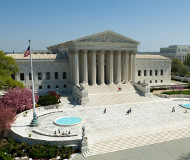12/22/2015
US Supreme Court To Update DUI ProceduresUS Supreme Court to decide constitutionality of laws criminalizing the refusal to give a breath or blood sample when accused of DUI.

The US Supreme Court plans to update the rules for prosecuting individuals accused of drunk driving by reviewing a trio of cases dealing with "refusal" statues.
In North Dakota, a state law makes it a crime for a motorist to refuse to take "any" type of test -- blood, alcohol or urine -- used to prosecute driving under the influence (DUI) cases. The court will take up the constitutionality of this provision in the context of two cases, Birchfield v. North Dakota and Beylund v. North Dakota, each of which presents the same question from a slightly different angle.
In Beylund, motorist Steve Michael Beylund agreed to take a blood test after being threatened with criminal penalties if he refused. In Birchfield, motorist Danny Birchfield refused to take a breath test. The highest court in North Dakota reviewed the existing legal precedent and found no reason to overturn the refusal law.
"Birchfield has not drawn our attention to any appellate court decisions striking down criminal refusal statutes, and we have found that since the [US] Supreme Court's ruling in McNeely, criminal refusal statutes have continued to withstand Fourth Amendment challenges, particularly in Minnesota," the North Dakota justices wrote.
Last month, however, the Hawaii Supreme Court did cite the US Supreme Court's reasoning in striking down criminal refusal statutes as unconstitutional (view case). In light of McNeely, Hawaii's justices believed the US Supreme Court had clearly ordered law enforcement to obtain a warrant before compelling a "search" of a person's blood, as the Fourth Amendment requires.
The US Supreme Court will tackle the divergent rulings in the context of a third case, Bernard v. Minnesota, which deals with that state's law treating a breath test as a "search incident to arrest."
In this case, William Robert Bernard Jr was not really driving anywhere. He used his truck to attempt to pull a boat out of the water. After Bernard was arrested, he refused a breath test.
"In sum, it is rational to conclude that criminalizing the refusal to submit to a breath test relates to the state's ability to prosecute drunk drivers and keep Minnesota roads safe," the Minnesota Supreme Court majority wrote. "We therefore hold that the test refusal statute is a reasonable means to a permissive object and that it passes rational basis review."
The high court will hear oral arguments on all three cases and then decide whether or not, as California DUI attorney Lawrence Taylor argues, that criminalized refusal statutes represent a "DUI exception to the Constitution."


